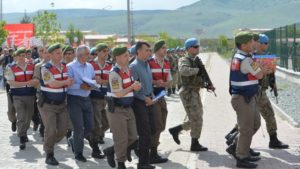Special to WorldTribune.com
Radio Free Europe / Radio Liberty
Turkish soldiers who are accused of participating in an attempted coup d’etat in 2016 are escorted to trial at a court inside Sincan prison in Ankara on May 22. / epa
Turkey has begun the trial of more than 220 suspects accused of being among the ringleaders of the failed coup against President Recep Tayyip Erdogan in July 2016.

Twenty-six former generals are among the defendants in the trial, which started in May 22 at a vast courtroom at a prison outside Ankara.
Erdogan’s government claims that the July 15 coup attempt was orchestrated by the U.S.-based Muslim cleric Fethullah Gulen, a claim he strongly denies.
Gulen, who lives in self-imposed exile in the U.S. state of Pennsylvania, is one of the 221 suspects named in the indictment. He is one of nine who are not in custody, with the others appearing in court.
The case is being heard in Turkey’s largest courtroom, which was purpose-built on the premises of a prison complex in Sincan, outside the capital, for trials connected to the coup attempt. It has space for more than 1,500 people.
The suspects were brought into the courtroom by security forces in front of television cameras. Security was tight, with a drone flying overhead and armored vehicles at the site.
Dozens of demonstrators holding Turkish flags booed at the suspects, shouting “we want the death penalty” and holding placards saying: “For the martyrs and veterans of July 15, we want the death penalty.”
The former generals charged include former Air Force chief Akin Ozturk and Mehmet Disli, the brother of senior ruling party lawmaker Saban Disli.
Also on trial is Colonel Ali Yazici, Erdogan’s former military aide.
Erdogan’s office says 248 people were killed in the failed coup — a figure that does not include 24 alleged coup plotters who were killed during the violence.
The trial is one of many being held across the country to judge Turks accused of involvement in the coup attempt, in what is the biggest legal process of Turkey’s modern history.
In February, the Sincan courtroom hosted the opening of the trial of 330 suspects accused of murder or attempted murder on the night of July 15.
State Of Emergency
More than 47,000 people have been arrested on suspicion of links to the Gulen movement in an unprecedented crackdown under a state of emergency that was imposed in the wake of the coup attempt.
The state of emergency has been renewed three times and is due to expire on July 19. But Erdogan said on May 21 it would remain in place until there is “peace and welfare,” and asserted that it had not affected civil rights.
The trial started on the same day Amnesty International published a report accusing Turkey of implementing “arbitrary dismissals” of public sector workers in a series of purges since the failed coup.
In the report titled No End In Sight, the rights group criticized the dismissals, which it said were “carried out arbitrarily on the basis of vague and generalized grounds of ‘connection to terrorist organizations.'”
More than 100,000 people from the public sector, including members of the judiciary and the military, have been fired since the attempted coup.
The Amnesty report says that more than 33,000 of those dismissed are teachers and other employees of the Education Ministry, while more than 24,000 are police officers and others from the Interior Ministry.
More than 8,000 are members of the military, at least 5,000 are academics, and some 4,000 are judges, prosecutors, and Justice Ministry officials, it says.
The rights group said that all those who lost their jobs were dismissed by decree under the state of emergency put into force several days after the failed plot.
Amnesty urged Ankara to put in place a “prompt and effective appeal mechanism for those already dismissed.”
